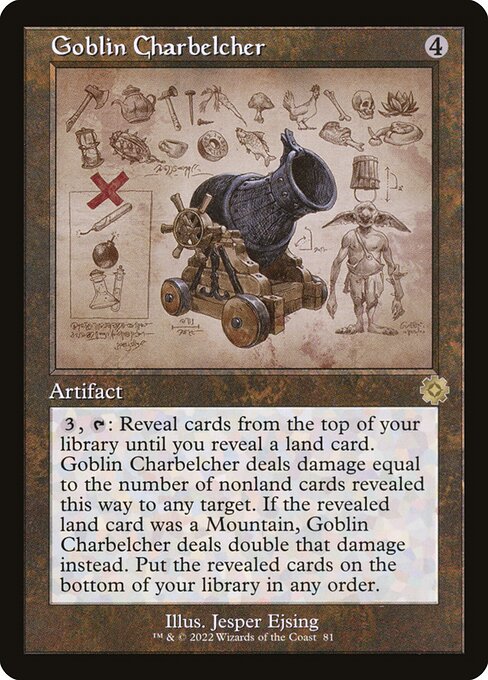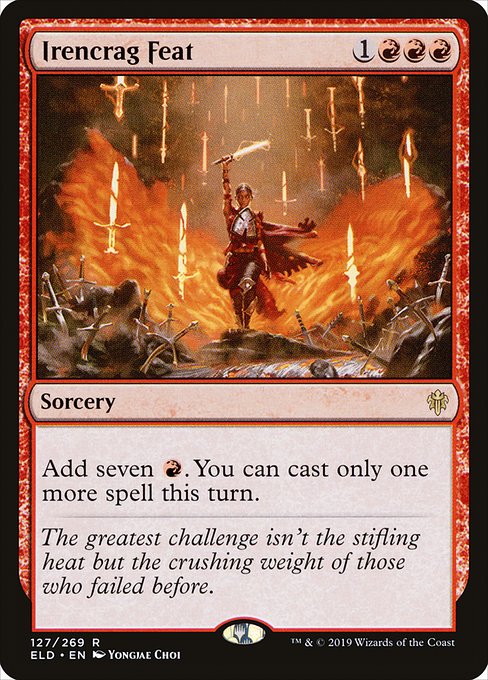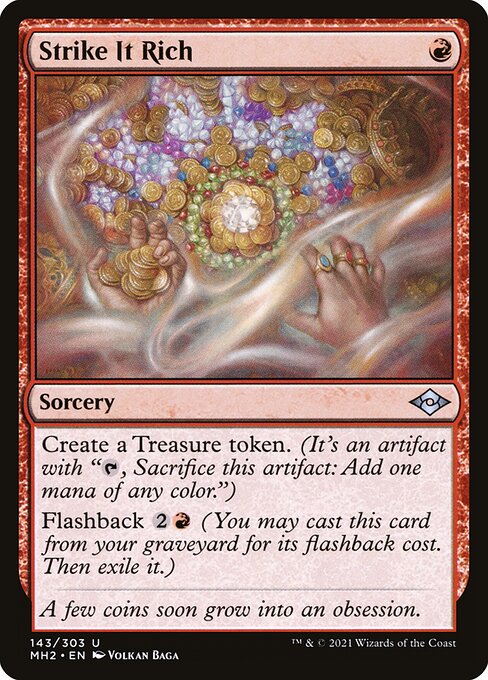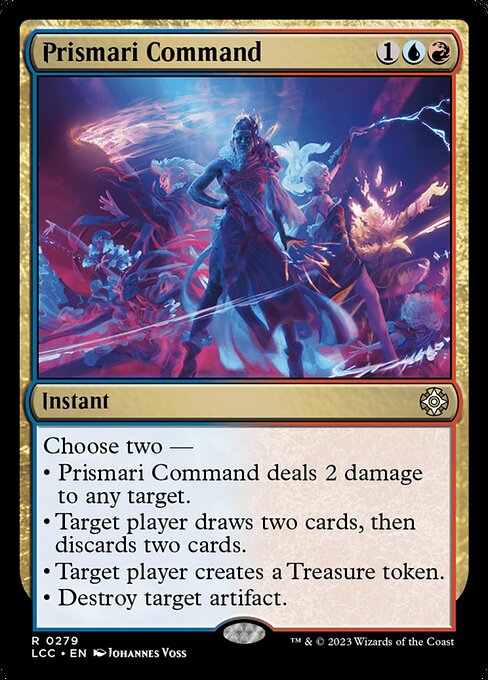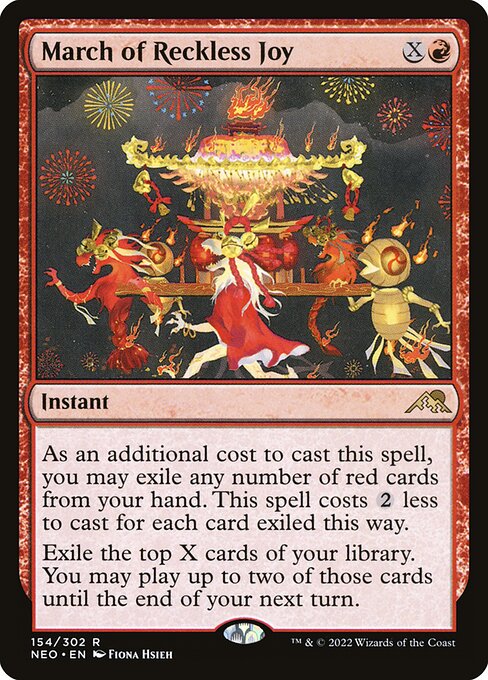Table of Contents
Along with The Brothers’ War, Historic got infused with a plethora of new artifacts as a part of the special retro frame treatment.
I spent some time scouring through them to decide which has the most potential to be broken. The scouring and Twitter idea hub made me decide to try out Goblin Charbelcher. I’ve tried many shells with many colour combinations, but eventually I ended up playing Izzet the most and with the highest win rate.

I did have expectations coming in, but whatever they were, the deck has greatly exceeded them. It’s resilient, it’s consistent, and most importantly… It’s FAST. Until now, Dragonstorm has been the combo deck that consistently goes off on turn four and is difficult to interact with – Belcher is way more difficult to disrupt and goes off a full turn earlier!
I have had games where I deployed Goblin Charbelcher as soon as turn two. If you queue up Best-of-One, you’ll blitz through the games like crazy. Last but not least, Historic is a very creature- and creature removal-heavy format, and by playing this deck, we dodge all the Fatal Push and Unholy Heat that the opponents draw.



Instants (32)
Sorceries (24)
Artifacts (4)
60 Cards
$317.48
Sideboard
15 Cards
$93.13
Deck Tech

Let’s start off with the combo in question.
This archetype is what’s known as a one-card combo. Technically, you don’t need anything else except for the titular Belcher. However, upon closer inspection you’ll see that the deck would be rather slow if you deployed it on turn four and used it on turn five. There is also another issue – how can we kill the opponent if the combo cares about the number of cards revealed that are not lands? We can’t play a deck with no lands… Or can we?
We technically can, as double-faced modal cards are spells on the front and lands on the back. Rules-wise, it means that if we reveal them to Belcher, it treats them as what it sees on the front which is a spell. The end result is that we reveal the whole deck as there is no card that’s seen as a land and we shoot the opponent for 40-ish damage.
If we had just the four Belchers, we’d be hard-pressed to mull each opener that does not have one. Thankfully, there are other ways to have access to our namesake. Indomitable Creativity with x=1 allows us to tutor out Goblin Charbelcher. If you want to rebuild the deck, remember you can’t add cards like Skirk Prospector or Mind Stone as they’d interfere with Creativity always finding Belcher; same goes for having creature threats in the board.
The main reason why I want to play red as one of the colours is Irencrag Feat. This is the main way to speed up the combo as it conveniently adds 7 mana – just enough to deploy and activate Goblin Charbelcher.
Coincidentally, the same amount of 7 mana is enough to cast Creativity for x=1 to find Belcher and activate it. In order to win on turn three, we need to have Belcher and Feat in hand, and four mana to actually play Feat. This can be done by creating a Treasure token on either turn one or turn two.
Strike it Rich is a very simple ramp effect that’s immune to creature removal. If you want to set up a turn-three win, it does not change much whether you Strike on turn one or turn two. Treasures are, in general, a very valuable resource for the deck, so do not use them up unless for a very good reason. Such good reasons would include winning the game or setting up to win the game, contrary to wasting a Treasure to cast Song-Mad Treachery. Even if you don’t need the mana, they are your Indomitable Creativity targets.
The second-best Treasure-maker. It can only be done on turn two, so you will frequently have to lead on a tapped land turn one, untapped land turn two, and use Magma Opus to set up a turn three win. There *might* be games where you hardcast Magma Opus, but they will be very rare so don’t play as if they were to happen.
The way you should approach it is that you turn on the hardcast mode when you are already in such a situation e.g. you top deck Magma Opus with 7 lands and 3 Treasure tokens on the battlefield. You ought not to warp the way you play to accommodate hardcasting Opus.
Arguably the most unfair card in the deck. It is a literal counterspell for zero mana that the opponents can’t really play around, especially if you’ve drawn multiple copies. There are two most common play patterns with Pact of Negation.
- You deployed a single Treasure on turn one or two and, therefore, have the mana to play Belcher. You need to get to the next turn to actually activate it. Once you’ve played Belcher, you hold up Pact(s). If the opponent plays something that would thwart the plan like March of Otherworldly Light, you counter it and then kill the opponent on your own upkeep in response to the Pact(s) trigger(s).
- You want to force Belcher through opposing countermagic. You put it on the stack and react to all the Archmage's Charms and Absorbs with Pact to make sure it resolves.
The deck plays another piece of on-stack interaction in An Offer You Can't Refuse. It, similarly to Pact, can help you force Belcher through or protect it once it’s on the battlefield. However, there is a much spicier usage – ramp. Strap in and let’s go.
- First turn you play Sea Gate Restoration untapped.
- The opponent plays a one-drop.
- You cast Pact of Negation on that one-drop.
- You hold priority to cast An Offer You Can't Refuse on your own Pact.
- You let everything resolve
- On the second turn, you play your second land and play Belcher as you now have 2 Treasures from the previous play.
- Profit!
In essence, if you An Offer You Can't Refuse your Pact, you won’t have to pay its trigger (as it does not resolve) and get 2 Treasures in return. As you paid one for An Offer You Can't Refuse, you net one mana.
On top of that, it can act as mana fixing. If you have too much blue mana and not enough red, you can play Strike it Rich and counter it with An Offer You Can't Refuse. You paid R and U to get double Treasure which can yield RR.
It’s a very tricksy card with multiple uses.
This is a flex slot and for now it’s occupied by Prismari Command thanks to its flexibility. The most common mode is draw two/discard two and make a Treasure. Sometimes, it may snipe opposing Belchers or Pithing Needle, but it won’t come up often. However, there will be games where you want to use it as removal. Against decks that really snowball like Elves, you may want to kill Elvish Archdruid and loot/treasure as it buys you at least one turn against them, probably even more.
Nevertheless, I am on the lookout for a card that’s better for this slot. One idea to try out is to replace Prismari Command with Expressive Iteration or try a 2-2 split. I might have to wait for something new to be printed though. I considered maindeck Fable of the Mirror-Breaker but game one I expect opponents to have removal, at which point the first and last chapters do close to nothing.
This card may look innocuous, but it’s wild how much it does to the deck. I did play Faithless Looting in the past, but I am fully Team March. It is, of course, a dig spell to find what you need. What’s key to remember is that it allows you to pitch any number of red cards to go 2 deeper. As this deck is a one-card combo and over half the lands are red, you will frequently be able to pitch 2-3 cards in addition to the mana you are willing to put in. The outcome is that you go 4-10 cards deep to find what you need. The usual play pattern is to go for a big March to find Belcher/Creativity/Feat or a very small March early to hit your land drops.
I try not to use up my Treasures to play March for more – I frequently prioritise pitching more cards rather than using up tokens. The reason is that March itself gives me access to a lot of cards while mana might be the bottleneck otherwise. If you are in a super critical position, you might try to March by pitching your entire hand to find Pact of Negation.
Land Sequencing
Your lands are very different from what you normally see in most decks as each of them can do something else as a spell and the majority enters tapped. There is no other way than to map out each hand three turns in advance before you decide whether it’s a keep or mull. With time, you will get better at doing it at a glance, fortunately. For instance, you might need to hold off the untapped land until turn three to be able to play it and then cast a vital spell. Sometimes, it might be better to play turn one Strike it Rich off of an untapped land, etc.
In addition to how often your lands come into play tapped, you should consider whether you are likely to need to use a given land as a spell. In some matchups, you will lead on Valakut Awakening so that you can actually cast Spikefield Hazard, and in others, you will do it the other way round to be able to filter your hand with Awakening. Similarly, you may want to hold up Jwari Disruption to counter your opponent’s spell in some cases.
All in all, you have to consider:
- When you can afford playing a tap land and when you need an untapped source
- Whether any of the lands might come in handy as spells
Especially in games that drag out, each drawn land will probably act as a spell.
Matchups and Sideboard Guide

Izzet Wizards
| IN | OUT |
|---|---|
| +2 Alchemist's Retrieval | -4 Prismari Command |
| +1 Strangle | -2 Magma Opus |
| +3 Brotherhood's End |
This is a tricky matchup as both of us are fast and can be interactive. Our interaction is mainly anti-creature as we’re better off stemming the bleeding rather than trying to fight on the stack. The main reason why is that they will assuredly have creatures every single game while they might not draw those 2-4 counterspells they side in.
Be on the lookout for Shatter effects like Abrade. The longer the game goes, the better it is for you. You do have to preserve your life total though as your untapped lands deal you a lot of damage.
Azorius Affinity
| IN | OUT |
|---|---|
| +3 Mystical Dispute | -4 Magma Opus |
| +3 Brotherhood's End | -2 An Offer You Can't Refuse |
In this matchup, the Shatter mode of Brotherhood's End is going to be supremely relevant, but remember that it will destroy your Treasure tokens. I do not side out Prismari Command purely on the grounds of the fact that destroying an artifact such as Nettlecyst is hugely relevant.
Mystical Dispute is mainly there to counter Metallic Rebuke and Thought Monitor, Spikefield Hazard may ping off Esper Sentinel which is useful.
Selesnya Lifegain
| IN | OUT |
|---|---|
| +2 Alchemist's Retrieval | -2 Prismari Command |
A weird matchup where your Belcher might actually not be able to one-shot the opponent. In those types of matchups, you may need to actually track how much damage you are going to deal your opponent. It might affect your gameplay as you may need to shoot the creatures down one by one rather than go face. On the flipside, you might need to set up a situation when you shoot twice and not die in between.
When exposed, Belcher might get hit by Skyclave Apparition. The best strategy is to go off as soon as possible as they don’t clock us that much.
Mono Red Aggro
| IN | OUT |
|---|---|
| +2 Alchemist's Retrieval | -4 Prismari Command |
| +1 Strangle | -2 Magma Opus |
| +3 Brotherhood's End |
Very similar to Wizards, but much easier as we know for a fact that they can’t interact outside of cards like Abrade. The strategy is very simple – go off fast or stay alive and go off later. You may need to track what cards the opposing Robber of the Rich exiles to be aware that, for example, you’ve got fewer Belchers to draw into.
Azorius Control
| IN | OUT |
|---|---|
| +3 Fable of the Mirror-Breaker | -4 Prismari Command |
| +1 Chandra, Torch of Defiance | -4 Irencrag Feat |
| +2 Chandra, Awakened Inferno | -1 Magma Opus |
| +3 Mystical Dispute |
This matchup is the most peculiar of them all as Control plays on a completely different axis. I side in Mystical Dispute and an assortment of value cards that help attack the opponent from a different angle. This strategy makes it much more difficult to play against us as our plan is now layered and they can’t just keep holding up countermagic.
Additionally, Mystical Dispute and Pact of Negation is still great to push Belcher through as their permission is much more expensive. If you lead on Irencrag Feat preboard, they may let it resolve and counter your payoff – Belcher. You could try out a cheeky strategy where you keep Feat post-board as they never counter it – they’d rather counter the payoff. However, you’d play Chandra, Awakened Inferno off of it and they would get got by us. Still, they’d know it for the next game and the trick won’t work.
Tips and Tricks

- Sometimes you might have to use Goblin Charbelcher on something else other than the opponent’s face, such as kill Platinum Angel, so don’t forget it can target anything!
- Once you have cast Irencrag Feat and then Belcher, you won’t be able to use Pact of Negation or An Offer You Can't Refuse due to Feat’s clause. There will be spots where it’s better to play just Belcher and hold up interaction.
- You can use Indomitable Creativity to target opposing permanents e.g. Pithing Needle naming Goblin Charbelcher.
- Sometimes it makes sense to cast Strike it Rich off a single Treasure from a previous Strike it Rich. While Treasure-neutral, you may value it being in the graveyard as opposed to some other zone. A perfect example is when you exile one with March of Reckless Joy and so you may want to have it in the grave for later rather than exiled forever.
- Remember you can sacrifice your Treasure tokens even if you don’t want to spend the mana. It’s relevant against Maelstrom Pulse or A-Teferi, Time Raveler minus to fizzle the effects.
- If your opponent counters your spell with Dovin's Veto and you were holding up An Offer You Can't Refuse, you can’t counter Veto. However, you can counter the spell they are countering with Veto so that at least you get two Treasures out of the exchange.
- Easily the most important tip – if you’ve cast Pact of Negation, its trigger will go on the stack on your next upkeep and Arena will just resolve it if you don’t have the mana to pay! One of the most common play patterns is to hardcast Belcher, hold up Pact, counter whatever relevant spell they play, untap, respond to the Pact trigger by using Belcher, and kill them before you could lose the game. As is, the game would kill you instead. The workaround – make a stop on your upkeep and/or hold priority with the Control button on your keyboard.



